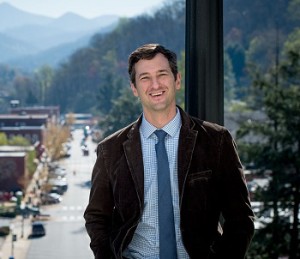by Jim Buchanan
Political Analysis originally published in The Sylva Herald in Nov. 12, 2020 edition.
The 2020 election in Jackson County was marked by two major trends: Increased turnout and a shift toward the Republican Party.
Turnout jumped to 72.07 percent of the county’s 29,593 registered voters this year, up from 66.98 percent of the 28,195 registered voters in 2016. According to unofficial returns, the county generally followed state voting trends, with the exception of leaning toward Republican Dan Forest in the gubernatorial race, which was won by incumbent Democrat Roy Cooper by a comfortable margin statewide.
The Herald presented a series of questions to Chris Cooper, Robert Lee Madison Distinguished Professor and department head of Political Science and Public Affairs at Western Carolina University to gain his insights into what went down and why across Jackson and Western North Carolina.

Dr. Christopher Cooper is political science professor and expert on NC politics. Photo by WCU.
Q: What stood out? Were there any significant shifts in voting patterns in Jackson and across the region from past elections?
A: The biggest surprise all night was Jackson County. We expected Jackson to be close, but it wasn’t particularly close at all. Trump beat Biden, Tillis beat Cunningham, Cawthorn beat Davis, Clampitt beat Queen and, perhaps most surprisingly, Forest beat Cooper. Given the large and growing numbers of unaffiliated voters it was tough to know how the county would go, but if 2020 is any indication, Jackson is trending red, and may soon leave the purple category altogether.
Q: Any other major surprises?
A: I am not surprised Democratic incumbent Joe Sam Queen lost (we call it a toss-up for a reason), but I am surprised at the size and breadth of challenger Mike Clampitt’s victory. Queen didn’t win a single precinct in Haywood County and only carried one precinct in Swain County, and three in Jackson County. It’s also noteworthy that Clampitt won this race despite being at a significant fundraising disadvantage at the last campaign finance update.
Q: What’s your take on the politics of the redrawn 11th congressional district, which again includes all of Buncombe County?
A: 2020 seemed to signify that the gulf between Buncombe County and the rest of North Carolina is growing, rather than shrinking. In the NC-11 race, Democrat Moe Davis was unable to win a single county outside of Buncombe. Representing a Buncombe County that is growing bluer by the day and the rest of the region which stands in stark contrast would be a tall task for any member of Congress. In the span of a single night, Republican Madison Cawthorn seemed both up the challenge of uniting these two worlds (talking about representing all of WNC in his speech) and creating even starker divisions (by tweeting out “Cry more, lib.” at 9:24 on election night).
Q: Were there any trends in Jackson that people may not have noticed?
A: Jackson County moved closer to the Democratic Party/away from President Trump at the residential level. Although Trump’s vote share increased (he garnered 52.99 percent of the vote in 2020 v. 52.74 percent in 2016), that is a bit of an illusion because the third party vote was so much larger in 2016 than 2020. So – looking at the flip side of the coin, Biden received 44.80 percent of the vote in 2020 v. Hillary Clinton’s 41.22 percent of the vote in 2016. Confused yet? Here’s the bottom line: although Biden lost Jackson County, he performed about 3.3 percentage points better than Clinton did in 2016. This pattern is true across Western North Carolina as Biden performed better than Clinton did in every county in the West (with the largest movement in Henderson County). Turnout was extraordinary; people were engaged. Turnout was slightly down at the WCU polling site in 2020 v. 2016 (2557 v. 2630), although it still saw the third most business of any of the early voting sites in the county. A fun footnote on the WCU site – it was the youngest early voting site in the state (e.g. it had the lowest average age) and also had the highest proportion of same day registrants in the state.
Q: Were you surprised Jackson voters trended Republican but also approved a tax increase (for a new indoor pool)?
A: The tax question is an interesting one. In the end, though, most of our elections were close – including the bond referendum. Neither party took a hard stance on the issue, and in the absence of outside signals, bond referenda usually pass. If the Republicans had campaigned hard against it, I think we might have had a different result.
Q: As a freshman representative in the minority party, does Cawthorn have a realistic chance of being effective?
A: Cawthorn’s path to power will clearly not be through the traditional, formal channels. He will not be on any high profile committees (nor is any freshman), he will be in the minority party and he is unlikely to be a skilled negotiator when it comes to navigating the byzantine rules and norms of the House of Representatives. His path to prominence, therefore, will be through the outside – garnering media coverage, and attention from those outside of the chamber and using that attention to leverage power inside of the chamber. In this way his career may resemble that of Mark Meadows – the most recent representative from the 11th.


